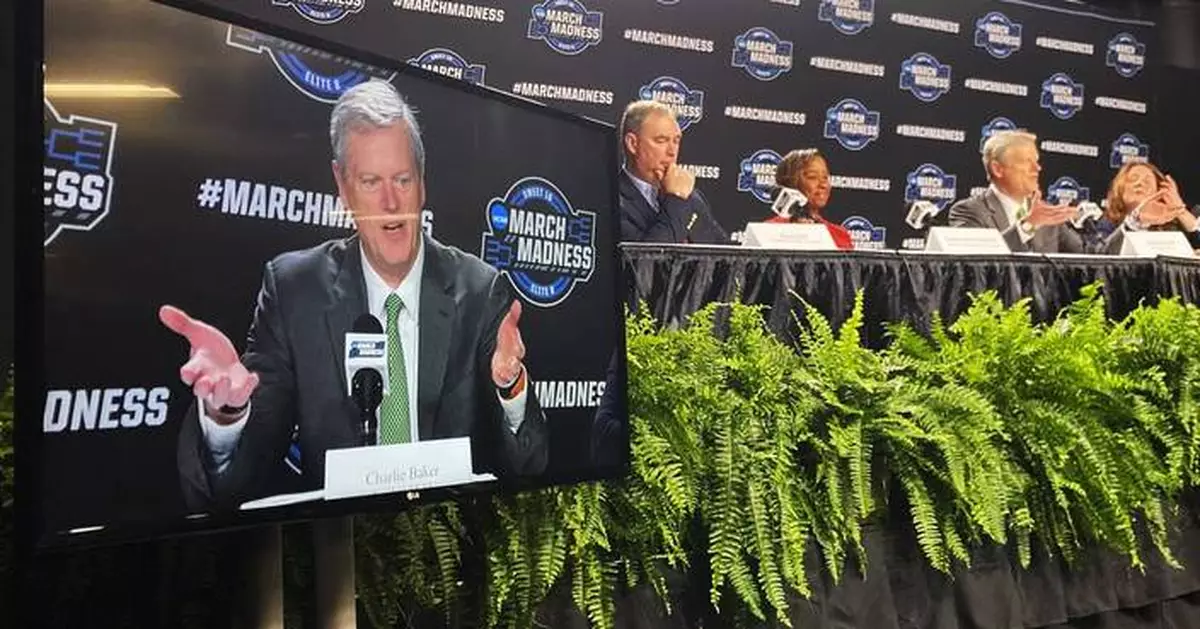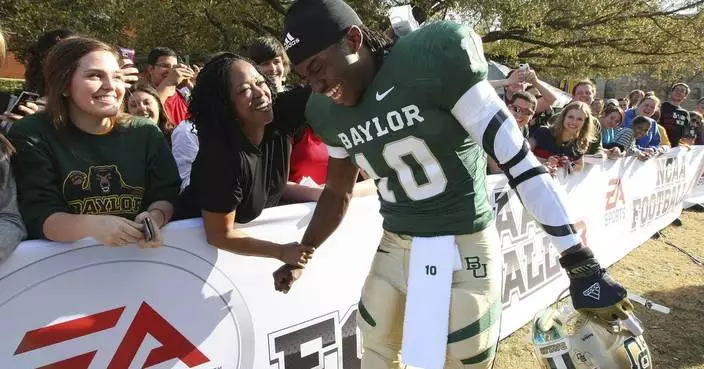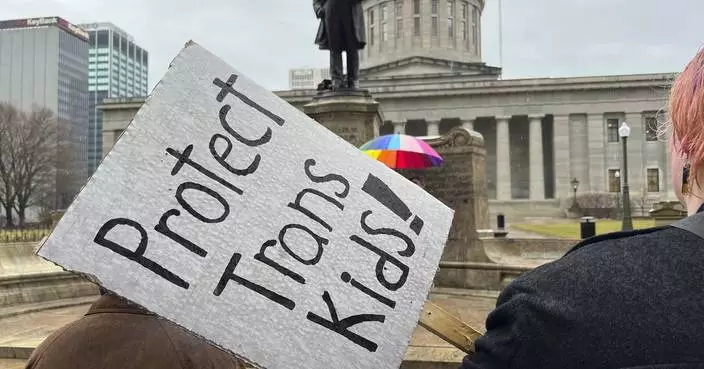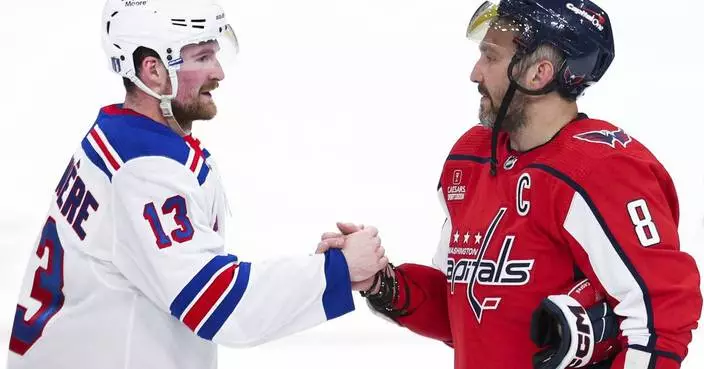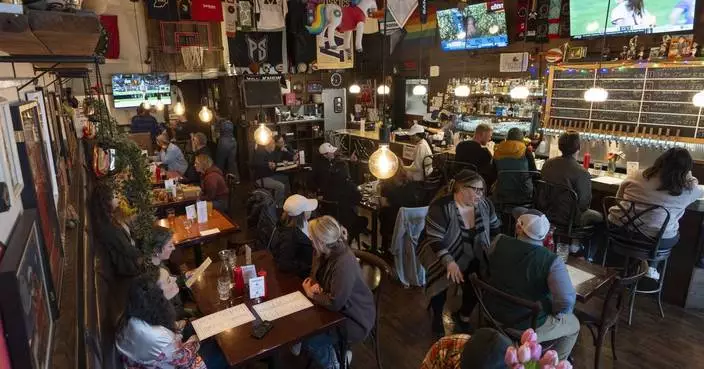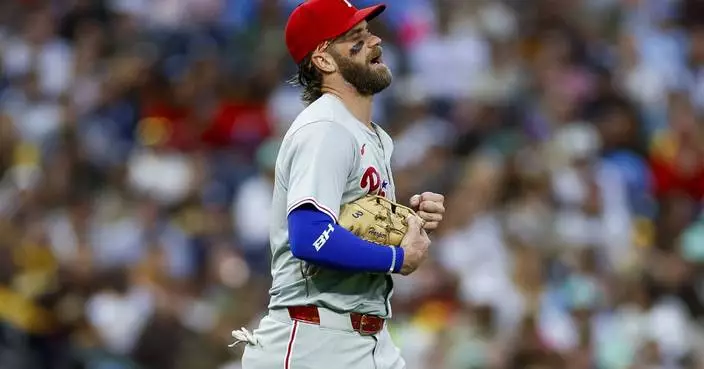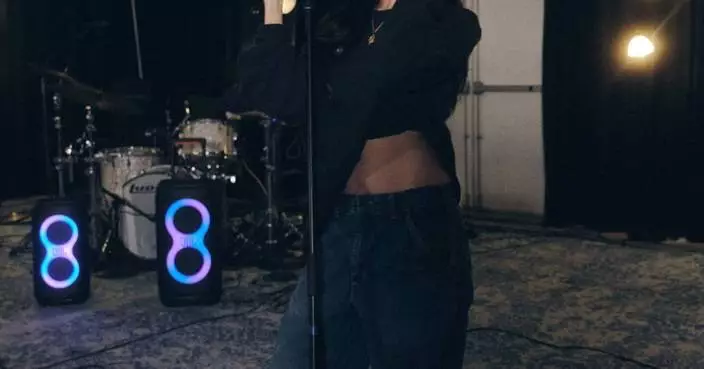BOSTON (AP) — Top Massachusetts officials joined with NCAA President and former Massachusetts Gov. Charlie Baker on Thursday to announce a new initiative aimed at tackling the public health harms associated with sports gambling among young people.
Baker said those harms extend not just to young people making bets, but to student athletes coming under enormous pressure from bettors hoping to cash in on their individual performances.
Baker said he spoke to hundreds of college athletes before officially stepping into the role of president about a year ago, and he said they talked about the tremendous pressure they feel from classmates and bettors about their individual performance.
“The message I kept getting from them is there’s so much of this going on, it’s very hard for us to just stay away from it,” he said.
Baker said student athletes pointed to classmates who wanted to talk to them about "how’s so-and-so doing? Is he or she going to be able to play this weekend? What do you think your chances are?”
“It was the exact same conversations I was having with my classmates and schoolmates in the ’70s. But back then it was just chatter in the cafeteria or the dining hall," added Baker, who played basketball at Harvard University. “Now it’s currency.”
Massachusetts Attorney General Andrea Campbell said that since the state made sports betting legal in 2022, a bill signed by Baker, Massachusetts has essentially become a participant in the market.
The creates a burden on the state to make sports betting as safe as possible, she said.
“Think about it. We’re putting an addictive product — gambling — on a very addictive device, your smartphone,” she said. “We’ve gone from sports gambling being illegal nearly everywhere to being legal in dozens of states throughout the country in just a matter of a few years."
In Massachusetts, it is illegal for anyone under 21 to wager on sports or in casinos.
Because young people are going to be influenced more by the teams they support than by state government officials, Campbell said it is critical to create a public/private partnership like the new initiative she unveiled Thursday, the Youth Sports Betting Safety Coalition.
Campbell said members of the coalition include the Boston Red Sox, the Boston Celtics, the Boston Bruins, the New England Patriots, the New England Revolution and the NCAA. The goal is to craft a sports betting education, training, and safety curriculum for young people 12 to 20, she said.
NCAA data found 58% of 18- to 22-year-olds have engaged in at least one sports betting activity, while the Massachusetts Department of Public Health found about half of middle school students are estimated to have engaged some form of gambling, Campbell said.
Baker said the NCAA is pushing states with legal sports gambling to bar “prop bets” — short for proposition bets — which allow gamblers to wager on the statistics a player will accumulate during a game rather than the final score.
Baker also said the NCAA's survey of students found that they were betting at essentially the same rate whether it was legal for them or not. It also found that one out of three student athletes has been harassed by bettors and one of 10 students has a gambling problem.
“It's basically a 50-state issue even if it's only legal in 38. And if you think kids under the age of 21 aren't doing this, you're kidding yourselves,” he said at the news conference at Boston's TD Garden.
He said the ugliness and brutality of some of the messages on social media platforms of some of the athletes in the NCAA tournaments is disturbing.
Last year, NCAA officials considered a threat by a bettor serious enough to a team that they gave them 24/7 police protections until they left the tournament, he said.
“For student athletes in particular, this is an enormously challenging issue, and for a lot of the ones that are really in the bright lights, as many here will be tonight, this is just one more thing I think all of us would like to see taken off the table,” he said.
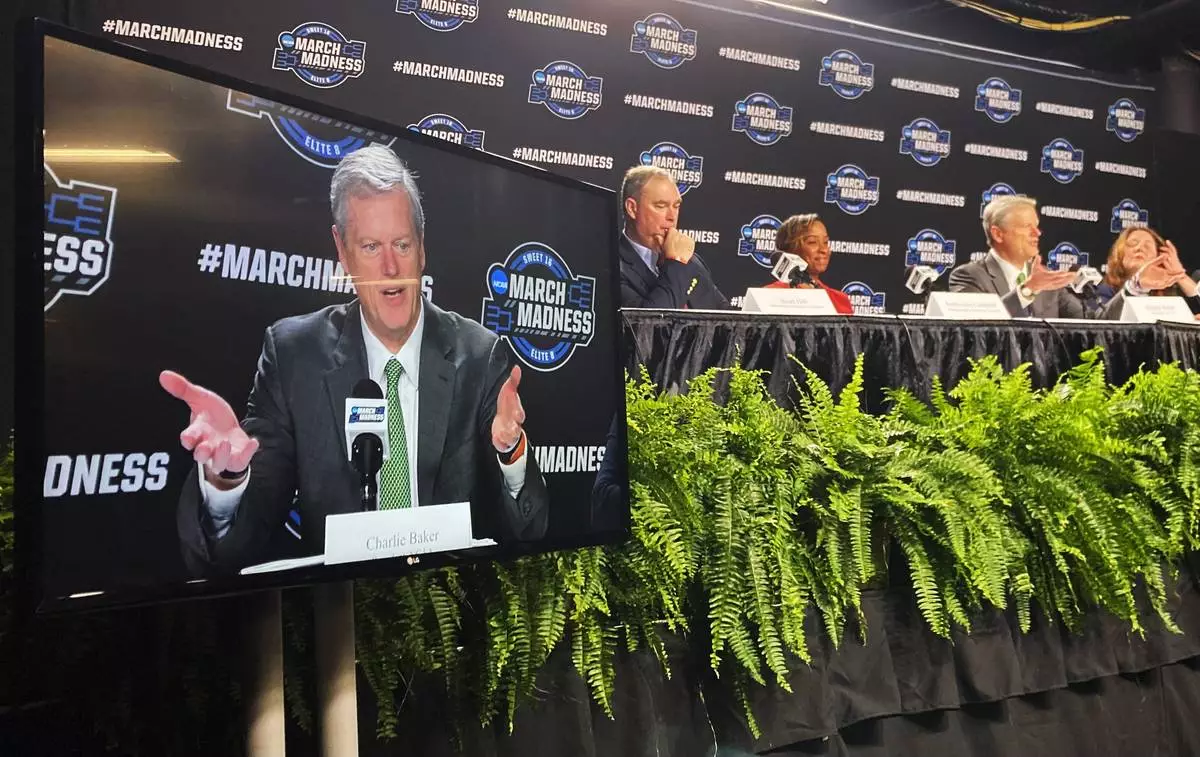
NCAA president and former Massachusetts Gov. Charlie Baker speaks at a news conference to announce a new initiative aimed at tackling the public health harms associated with sports betting among young people, Thursday, March 28, 2024, in Boston. Baker said those harms extend not just to young people making bets, but to student athletes coming under pressure from bettors hoping to cash in on their individual performance. (AP Photo/Steve LeBlanc)
A settlement being discussed in an antitrust lawsuit against the NCAA and major college conferences could cost billions and pave the way for a compensation model for college athletes.
An agreement has not been finalized and many questions remain unanswered. It is also unclear if new rules could withstand further legal scrutiny, but it appears college sports is heading down a revolutionary path with at least some schools directly paying athletes to participate. Here's what is known and what still needs to be figured out:
House vs. NCAA is a class-action federal lawsuit seeking damages for athletes who were denied the opportunity to earn money from use of their name, image or likeness going back to 2016. The plaintiffs, including former Arizona State swimmer Grant House, are also asking the court to rule that NIL compensation should include billions of dollars in media rights fees that go to the NCAA and the wealthiest conferences (Big Ten, Big 12, Atlantic Coast and Southeastern), mostly for football and basketball.
The settlement being discussed could have the NCAA paying nearly $3 billion in damages over 10 years, with help from insurance and withholding of distributions that would have gone to the four big conferences. Last year, NCAA revenue approached $1.3 billion and the association projects a steady rise in coming years, thanks mostly to increases baked into the television contract with CBS and Warner Bros. Discovery for the men's basketball tournament. A new, eight-year deal with ESPN worth $920 million f or the Division I women's basketball tournament and other championship events takes effect in 2025.
The potential settlement also calls for a $300 million commitment from each school in those four conferences over 10 years, including about $20 million per year directed toward paying athletes. Administrators have warned that could lead to program cuts for the so-called non-revenue sports familiar to fans who watch the Olympics.
“It’s the Olympic sports that would be in jeopardy,” Alabama athletic director Greg Byrne said during a March panel in Washington led by Sen. Ted Cruz (R-Texas). “That’s men and women. If you look at the numbers for us at the University of Alabama, with our 19 sports outside of football and men’s basketball, we lost collectively almost $40 million."
Not entirely clear. Presumably, it would start with the athletes in sports that produce most of the revenue: football and men's basketball players at the biggest and wealthiest programs. Women's basketball is likely next in line, but it is possible athletes in all sports could see some benefit — but probably not at all schools.
What's being considered is allowing schools to pay athletes, but not requiring those payments. Schools that don't rake in millions in TV revenue wouldn't necessarily be on the hook. There are also unanswered questions about whether the federal gender equity law Title IX would require equal funding for male and female athletes.
Getting the presidential boards of four conferences and the NCAA board of governors to approve a settlement is not a given, not to mention the plaintiffs in the House case. Still, the possibility of having to pay $4 billion in damages — and the NCAA has been on the losing end of many recent court cases — has spurred interest in a deal before trial begins in January.
The case is being heard in the Northern District of California by U.S. Judge Claudia Wilken, who has already ruled against the NCAA other landmark antitrust lawsuits and ordered the sides in House to seek a settlement.
Settling existing cases is only one step. A new system for compensating college athletes would be needed to avoid similar challenges in the future; for example, anything that looks like a cap on compensation by, say, the four major conferences would be ripe for another lawsuit.
The NCAA has been asking Congress for some kind of antitrust exemption for years, but the emphasis has shifted lately from regulating NIL compensation to keeping the athletes from being deemed employees.
A ruling from an NLRB regional director paved the way for members of the Dartmouth men's basketball team to vote to join a union after being deemed employees, and many have advocated for collective bargaining as a solution to college sports' antitrust exposure.
Jason Stahl, executive director of the College Football Players Association advocacy group, says lawmakers should create a special status for college athletes that would give them the right to organize and collectively bargain without actual employee status.
Stahl said even though many college athletes are apprehensive about being employees and joining a union, they should have the right to decide that.
"My concern is there would be some type of one-two punch," Stahl said of a lawsuit settlement followed quickly by federal legislation to codify a revenue-sharing plan that precludes athletes from employee status and the right to organize. “A lot of things I'm hearing about this cap are not things I want to be hearing."
There are so many moving parts that it is hard to say with certainty, though settling House seems to a priority for late spring or summer. The earliest for any true changes noticed on campus would be fall of 2025.
AP college football: https://apnews.com/hub/college-football
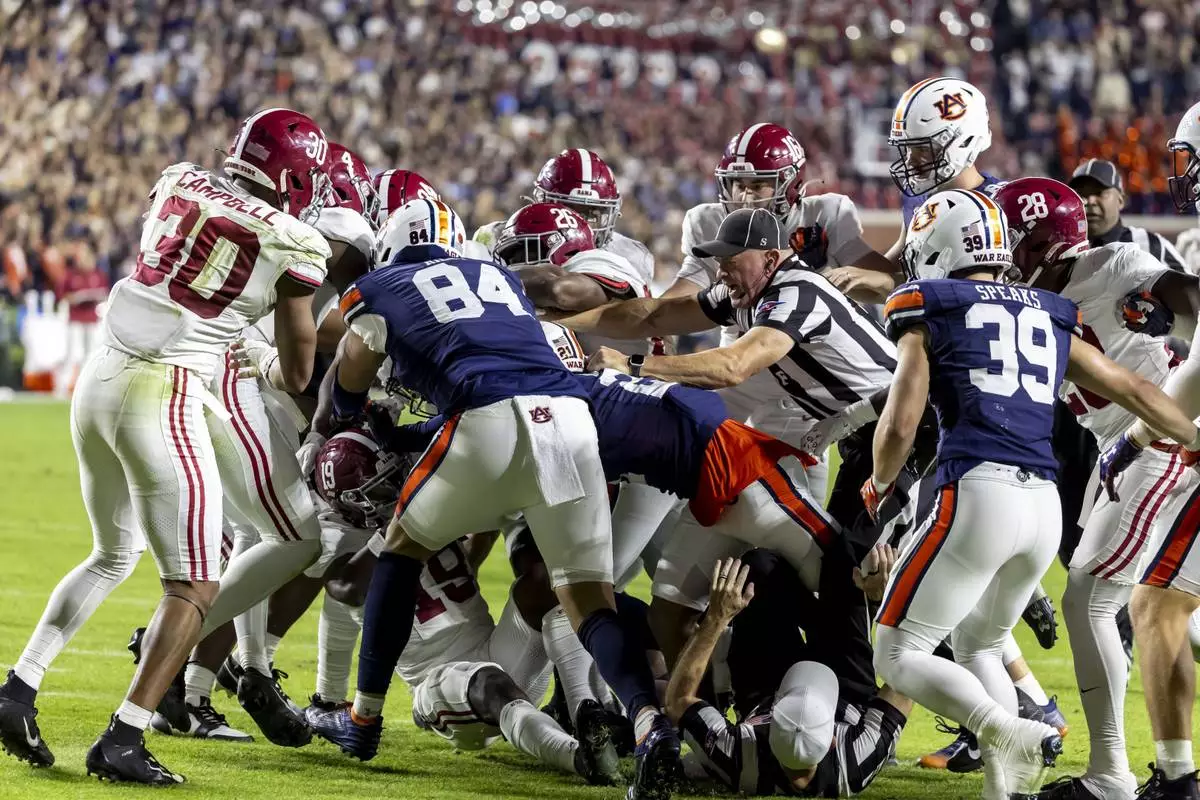
FILE - Referees try to break up an altercation between Alabama and Auburn during the second half of an NCAA college football game, Saturday, Nov. 25, 2023, in Auburn, Ala. A settlement being discussed in an antitrust lawsuit against the NCAA and major college conferences could cost billions and pave the way for a new compensation model for college athletes. (AP Photo/Vasha Hunt, File)
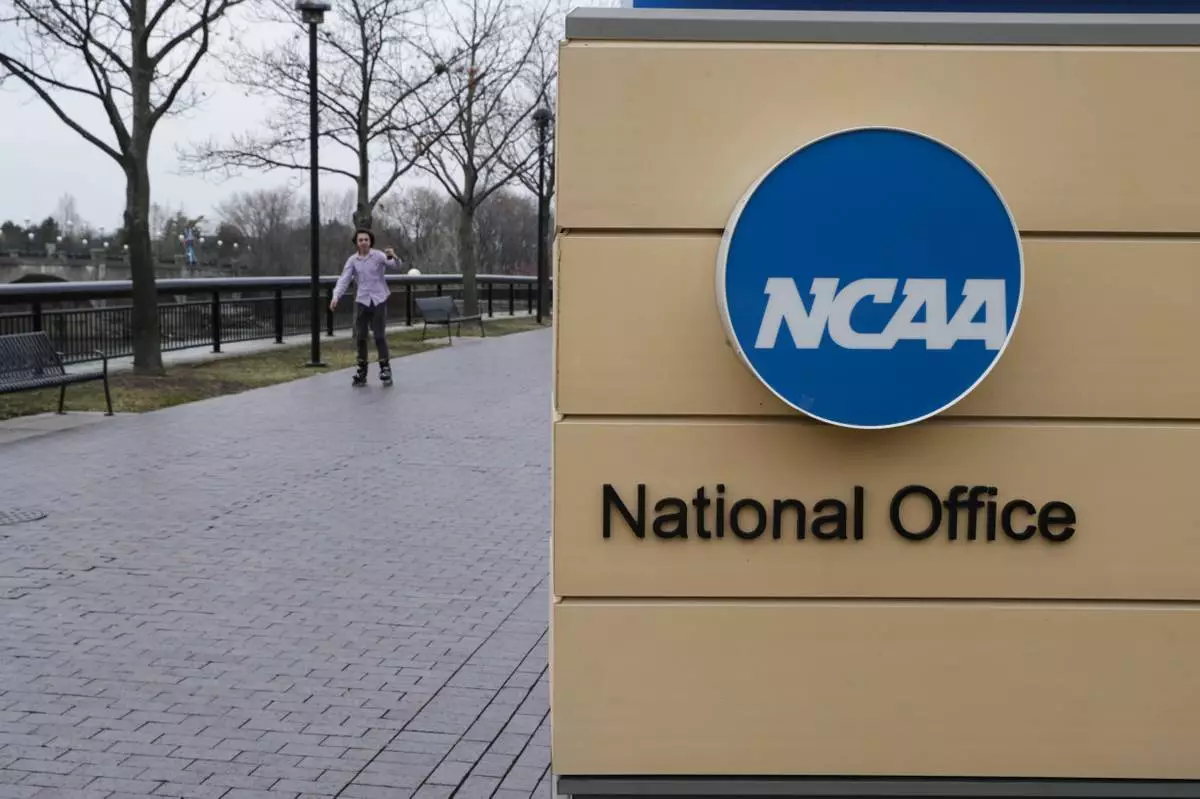
FILE - NCAA signage outside the headquarters in Indianapolis, Thursday, March 12, 2020. A settlement being discussed in an antitrust lawsuit against the NCAA and major college conferences could cost billions and pave the way for a new compensation model for college athletes. (AP Photo/Michael Conroy, File)
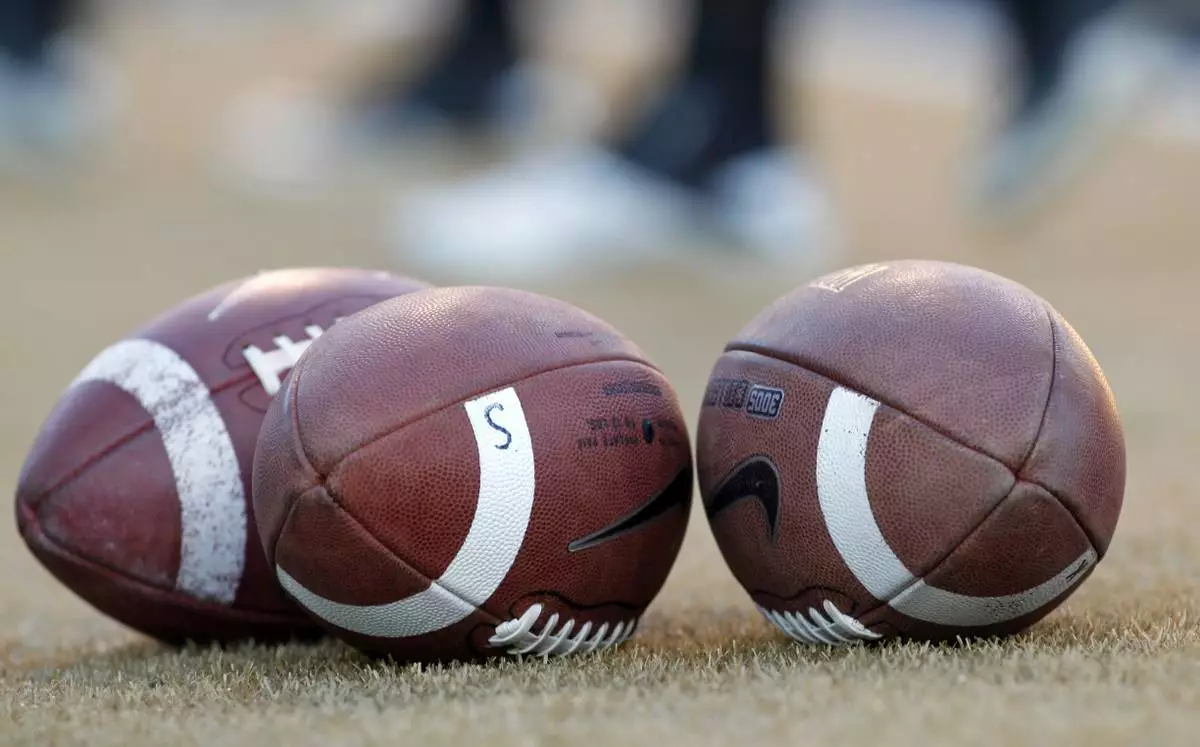
FILE - Footballs stand ready before the Virginia Tech at Wake Forest NCAA college football game in Winston-Salem, N.C., Saturday Oct. 15, 2011. A settlement being discussed in an antitrust lawsuit against the NCAA and major college conferences could cost billions and pave the way for a new compensation model for college athletes. (AP Photo/Bob Leverone, File)



